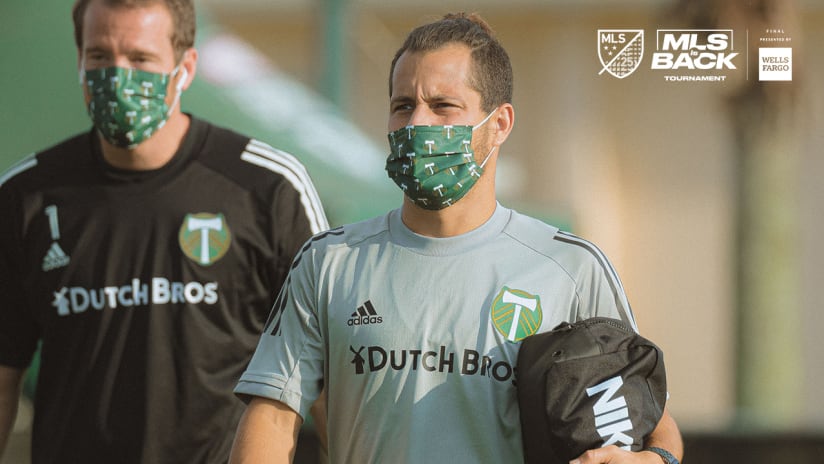ORLANDO, Fla. – He’s been the Portland Timbers’ best player at the MLS is Back Tournament, and in his first answer of Monday’s pre-final press conference, Sebastián Blanco referenced a theme that’s been constant during Portland’s run.
“This tournament, we’re more mature,” the Argentine attacker said, when asked to compare Portland’s MIB success to the team’s Western Conference title in 2018.
“We have a different type of energy,” he explained. “This is a short tournament, so the opportunities are more limited … this tournament, we’re prepared to win it …”
It’s easy to point to positives after success, forgetting that, in real time, outcomes are less certain. But looking back at how the Timbers reached tonight’s final against Orlando City SC (5:30pm PT, ESPN), elements of that maturity are clear. The team has only trailed twice during the tournament, and did so for a combined 57 minutes – only 11 percent of the time they’ve played in Orlando. That too may be more symptom than cause, but over their first six tournament games – and in the face of mistakes that have made games close – Portland have maintained their composure. Largely, they’ve kept matches under their control. They’ve been mature.
“It didn’t start at the beginning of this tournament,” head coach Giovanni Savarese said on Monday, talking about his team’s approach. “It started from the [beginning of COVID-19] quarantine, from the discipline of the players in the way they conducted themselves; how they came back to individual training … From that time, the mentality has been positive.”
The maturity behind the mentality was exemplified in an unexpected form on Monday: in a question about team captain Diego Valeri’s role in the team. Twice during MLS is Back, the former league Most Valuable Player began matches on the bench, though he’s not the only starter who has been spelled. Right back Chris Duvall has also been rotated out twice, with almost every other Timbers taking at least one turn out of the starting lineup. Only Blanco, Diego Chara and Steve Clark have started every match of the tournament.
“The role for each one of us, it’s always the same,” Valeri said, taking an inquiry about his “adjusted” role in stride. “It’s trying to give the team what the team needs in your individual capacity. That’s all. We have a coaching staff that plans every game. This is a tournament where we have games very [close together]. It’s more about that.
“In my case, every time I came in from the bench and tried to affect the game, I tried to be at my best level.”
It’s the type of answer Timbers fans have come to expect from a club icon, but it’s not one that should be taken for granted. Valeri is a starter, a captain, somebody who remains one of his team’s most important players and, as of Monday, somebody who has to answer questions about his role. It’s not always easy to bite your tongue in the face of such queries, especially when you’ve helped your team to a final. In some sense, his willingness to do so is a sign of the maturity Blanco talked about.
There are other examples of this subtle skepticism, too. When Major League Soccer released its nominee list for MLS is Back’s team of the tournament (Best XI), the Timbers had four representatives on the list. The Philadelphia Union had six. Minnesota United FC had five. Columbus Crew SC, a team that was eliminated in the Round of 16, matched the Timbers’ number: four. Individual rewards don’t always map perfectly onto team results, but it’s a sign of how the team’s regarded. There was room for Blanco, Chara, Jeremy Ebobisse and Larrys Mabiala; not enough bandwidth for Eryk Williamson, Dario Zuparic or Jorge Villafaña.
Another sign has been the betting odds MLS’ website has begun featuring on its homepage’s scoreboard. Ahead of the Timbers’ Round of 16 meeting with FC Cincinnati, Portland was favored. It’s the only time this tournament those betting lines liked the Timbers’ chances.
Individually, those things are easy to tune out. Collectively, they describe an environment, within which Portland has had to maintain their focus.
“We don’t play for the commentators,” Savarese said after his team’s semifinal victory. “We don’t play for the writers. We play for our fans, for ourselves, for the group, for our families … We came here with a lot of humbleness to work, to make it difficult, to achieve something important, and the guys have been able to do that.”
Portland was probably not the only mature team to play in Orlando, but for the Timbers, maturity is what they needed to stay focused on themselves. It’s what they needed to improve on March’s results, and it’s what they needed to build on a disappointing end to 2019.
On Tuesday, should the Timbers cross their last MLS is Back obstacle, maturity will have played a defining part.












